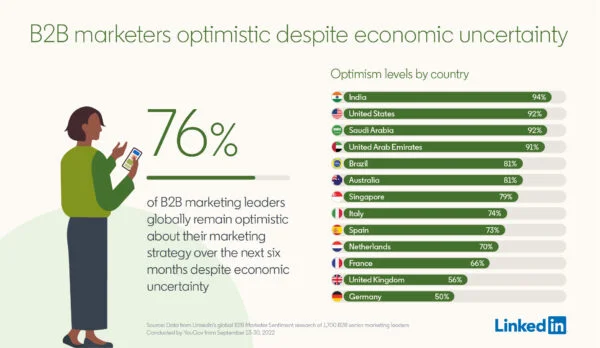New research from LinkedIn suggests the marketing industry is in rude health despite global fiscal issues.
Of the 1,700+ respondents, the majority (76%) of senior B2B marketers are optimistic about their marketing strategy over the next six months, with 67% planning to maintain or increase spend on brand building in particular.
While this looks encouraging on the surface, there is a large difference between Europe and the rest of the world.
Germany, GB, Italy, Spain, France and Holland are all far less enthusiastic than those in the Americas, Asia, the Middle East and Australasia.

Nikki Dawson head of EMEA marketing at sales platform Highspot agrees with LinkedIn’s findings.
“Our latest report, looking at key confidence indicators among sales and marketing professionals, revealed 55% of marketers across Europe cite the cost-of-living-crisis as one of their top concerns when it comes to hitting their target over the next 12 months.
“This figure rises to 65% in the UK. Despite this, it is evident from businesses we speak with that they are putting a greater focus on efficient growth and spending and are not deterred from meeting their goals. Optimism remains strong.”
A primary factor in improving budgets is getting stakeholders and leadership teams to appreciate marketing ROI according to the LinkedIn report.
Of the companies that saw budgets impacted, three in ten say the business does not understand B2B marketing ROI.
Meanwhile, B2B marketers globally said that measuring campaign effectiveness and proving ROI of marketing investments is their biggest challenge right now.
Tom Pepper, senior director, EMEA and LATAM at LinkedIn Marketing Solutions, expanded on the findings.
“Despite economic headwinds, it’s positive to see B2B marketers remain optimistic about their strategies as they navigate through uncertainty. Pausing ad spend can seem like a cost-saving measure, but savvy marketers know that recovering from a drop in memorability and recall can be far more costly in the long term. Focusing efforts on brand building can be fruitful, especially as competitors pull back.
“It is clear that the biggest challenge facing marketers right now is proving marketing ROI to the business, which is crucial to strengthening future budgets. There is a strong need for more education around marketing effectiveness so the true value that B2B marketers deliver is clearly understood.”
Managing director at marketing experts Embryo, Ross Green, warns against cost-cutting in such turbulent times.
“During uncertain times, we can understand why some businesses think about reducing their marketing spend, however this is not a smart decision. Consumers now more than ever are searching Google and other online platforms for information to help them with their decision-making before making a purchase. This is why brands need to keep investing in digital marketing channels in order to continue competing in the market and grow their business.
“Investing in organic channels like content, SEO and digital PR can help a business be discovered by those consumers who are looking for your products and services, while paid search and social media can increase your brand awareness and target consumers at multiple stages of the buyer funnel.”
Do more with less
Marketing budgets are notoriously difficult to both obtain and justify, and this is often linked to the relative unreliability of the most prominent marketing roles.
Researchers at Spencer Stuart found the average CMO tenure in 2021 was 40 months, tying 2020 as the lowest level in more than a decade; the average CEO tenure in 2021 was 85 months, more than double the average CMO.
This short-termism means marketing departments are used to quick turnarounds with limited resources, and Sarah-Jane McQueen, head of marketing for training provider CoursesOnline explains how they cut overspend.
“We connect learners to education and like a lot of organisations working in our space we definitely felt the pinch when search intent decreased post lockdown and the world started to return to normal after the pandemic. But as a group we mobilised quickly to adapt our business goals and marketing strategy to ensure we could continue to grow and maximize the opportunity.
“Our focus has been to trim down vanity or unprofitable channels and campaigns, and work hard with our SEO, product and tech teams to make sure our non-paid channels are really firing. We invested more in CRO and the right talent to execute on a robust CRO strategy across our marketplace websites. We hired a new PPC agency who matches our ambitions and values. We also bolstered our data capacity and literacy internally and with our partners to make sure all our decisions are driven by data.”
Such practical action may be necessary across most sectors, despite the inherent optimism in the marketing outlook moving forward.





